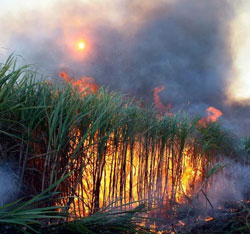University researchers from California, Iowa and Chile have found that sugarcane ethanol production creates up to seven times more air pollutants than previously estimated, according to news from the University of Iowa.
 The research team used agricultural survey data from Brazil to calculate emissions of air pollutants and greenhouse gases from the entire production, distribution, and lifecycle of sugarcane ethanol from 2000 to 2008.
The research team used agricultural survey data from Brazil to calculate emissions of air pollutants and greenhouse gases from the entire production, distribution, and lifecycle of sugarcane ethanol from 2000 to 2008.
The estimated pollutants were 1.5 to 7.3 times higher than those from satellite-based methods, according to lead author Elliott Campbell of the University of California, Merced.
Greg Carmichael, Karl Kammermeyer Professor of Chemical and Biochemical Engineering in the UI College of Engineering and co-director of the Center for Global and Regional Environmental Research (CGRER), and UI assistant professor Scott Spak note that the findings reflect continued practices and trends that are a part of the production of sugarcane ethanol. These include the practice of burning sugarcane fields before harvest, as well as the fact that sugarcane production in Brazil continues to grow.
“We found that the vast majority of emissions come from burning the sugarcane fields prior to harvesting, a practice the Brazilian government has been moving to end,” says Spak. “However, the sugarcane industry has been expanding rapidly and moving into more remote areas, which makes it much more difficult to enforce new regulations over this growing source of air pollution and greenhouse gases.
“As people try to determine how to integrate biofuels into the global economy, Brazilian sugarcane ethanol has often been considered a more environmentally friendly fuel source than U.S. corn ethanol. In fact, the U.S. Environmental Protection Agency considers sugarcane ethanol an ‘advanced biofuel’ with fewer greenhouse gas emissions than conventional biofuels like corn ethanol. These new findings help us refine those estimates and move closer to making more informed comparisons between different fuel sources, and ultimately make better decisions about how to grow and use biofuels,” Spak says.
The study, titled “Increased estimates of air-pollution emissions from Brazilian sugarcane ethanol,” is featured in the Nature Highlights section and published in the Dec. 11 Advance Online Publication of the journal Nature Climate Change.

